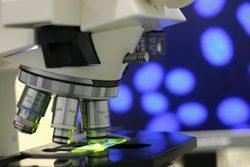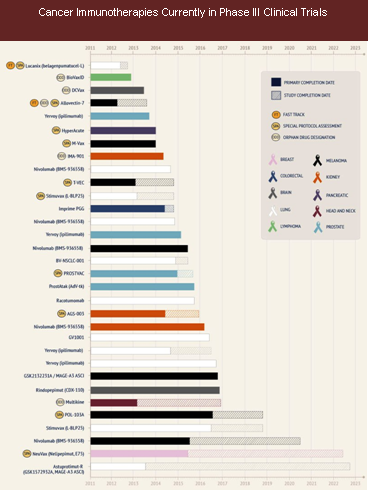| Profiles > Philanthropy > Cancer Research Institute | |||||||||||||||||||
| Cancer Research Institute | |||||||||||||||||||
|
|||||||||||||||||||
|
The institute was founded by Helen Coley Nauts to continue the work begun by her father, Dr. William Coley, who pioneered non-surgical, immune-based treatments for cancer. Over the course of more than 50 years, the institute has undergone several important programmatic evolutions in response to developments in the field of cancer immunology. Beginning in 1971, a body known as Scientific Advisory Council was formed, bringing together many of the world’s most distinguished immunologist. After this, in 1977, the institute established its Postdoctoral Fellowship Program to attract outstanding young scientists to immunology and train them in the best labs under the tutelage of skilled mentors. In 1986, the institute established the Investigator Award Program as a complement to its postdoctoral fellowships. Decades of investments in immunology by the CRI paid significant dividends in the 1990s. With deeper knowledge of the immune system’s basic workings, scientists were able to create techniques toidentify cancer antigens suitable to betested as vaccines. The institute added another program known as Student Training and Research in Tumor Immunology, which is a training program to support graduate students planning to pursue a career in cancer immunology. In 1994,the CRI initiated the International Symposia Series. In late 2007, the Irvington Institute for Immunological Research merged with the Cancer Research Institute, combining its postdoctoral fellowship program with that of CRI. As a result of the merger, the CRI was able to increasethe number of fellows it funds each year by 25%. In 2010, CRI took a strategic step torealizeits mission to conquer cancer through immunotherapy, with the launch of the Cancer Vaccine Acceleration Fund. Guided by a world-renowned Scientific
|
||||||||||||||||||
| Advisory Council, which includes three Nobel laureates and thirty members of the National Academy of Sciences, CRI has invested more than $200 million tosupport research conducted by immunologists and tumor immunologists at the world’s leading medical centers and universities. It has also contributed to many of the key scientific advances that demonstrate the potential to change the face of cancer treatment through immunotherapy. | |||||||||||||||||||
| CANCER IMMUNOTHERAPY Immunotherapy is a new class of cancer treatment that works to harness the innate powers of the immune system to fight cancer. Because of the immune system's unique properties, these therapies may hold greater potential than current treatment approaches to fight cancer more powerfully, to offer longer-term protection against the disease, to come with fewer side effects, and to benefit more patients with more cancer types. |
|||||||||||||||||||
| Research Programs | |||||||||||||||||||
| In fiscal year 2012, CRI awarded morethan $12.8 million to accelerate cancer immunology research and cancerimmunotherapy clinical development at more than 30 research centers worldwide.Funded investigations have had direct relevance on the understanding of more than20 different types of cancer. It will also help focus on some of the most critical questionsand innovative approaches in cancer immunology and immunotherapy. | |||||||||||||||||||
| Pre-doctoral Emphasis Pathway in Tumor Immunology - Four-year awards to universities to support establishment and maintenance of tumor immunology training courses for graduate students. | |||||||||||||||||||
| Student Training and Research inTumor Immunology Program - Two-year awards that attract bright young minds to rewarding careers as cancer immunologists by funding graduate studies in tumor immunology at top universities. | |||||||||||||||||||
| Irvington Institute Fellowship Program of the Cancer Research Institute - Three-year awards that further career development and support advanced laboratory research for promising postdoctoral fellows working under the mentorship of world-class immunologists and tumor immunologists. | |||||||||||||||||||
| Clinical and Laboratory IntegrationProgram | |||||||||||||||||||
|
|||||||||||||||||||
| Annual Awards | |||||||||||||||||||
|
In addition to providing financial support to researchers and investigators, CRIalso honors scientists and community leaders with achievement awards. William B. Coley Award for Distinguished Research in Basic and Tumor Immunology - An annual prize given to one or more scientists whose discoveries in the fields of immunology or tumor immunology contribute to the advancement of immune system-based therapies for cancer. Oliver R. Grace Award for Distinguished Service in Advancing Cancer Research - Anannual prize that recognizes the contributions of dedicated laypersons whose leadership has had a significant impact on cancer research. Frederick W. Alt Award for New Discoveries in Immunology - A prize to honor former postdoctoral fellows in recognition of their outstanding success in academia or industry for research that may potentially have a major impact on immunology. |
|||||||||||||||||||
| Major Discoveries and Research Accomplishments | |||||||||||||||||||
|
|||||||||||||||||||
|
LUSTGARDEN FOUNDATION - In 2011, CRI and the Lustgarten Foundation partnered to explore ways in which immunotherapy could impact pancreatic cancer treatment. With a five-year survival rate of only 6%, pancreatic cancer is by far the deadliest type of cancer. AMERICAN ASSOCIATION FOR CANCER RESEARCH - AACR is the oldest and largest scientific organization in the world focused on high-quality, innovative cancer research. MELANOMA RESEARCH ALLIANCE - Since its founding in 2007, MRA has awarded more than $51 million to 121 research programs that hold promise of turning scientific discoveries into tools and/or treatments for melanoma patients and all at risk. COMMUNITY HEALTH CHARITIES - The charity works to improve the lives of people impacted by a disability or chronic disease by uniting caring donors in the workplace with credible national and community-based health charities. Since 1957, CHCA has partnered with its member health charities in the workplace to provide a cost-effective partnership to enhance the ability to deliver more of every donated dollar through the workplace - toward missions of its member health charities. HEALTH RESEARCH ALLIANCE - Health Research Alliance fosters collaboration among not-for-profit, non-governmental donors to support the continuum of health research and training from biomedical science applications that advance healthcare. |
|||||||||||||||||||
| Each year, 12.6 million men, women, and children worldwide are diagnosed with some type of cancer. Continued research to find better, smarter, more effective treatments is urgently needed. | |||||||||||||||||||
| To Donate: http://www.cancerresearch.org | |||||||||||||||||||
|
Credits
2012 CRI-Annual-Report http://www.cancerresearch.org/about/history http://www.cancerresearch.org/cancer-immunotherapy/cancer-immunotherapy-pipeline http://en.wikipedia.org/wiki/William_Coley http://www.cancerresearch.org/about/partners |
|||||||||||||||||||












